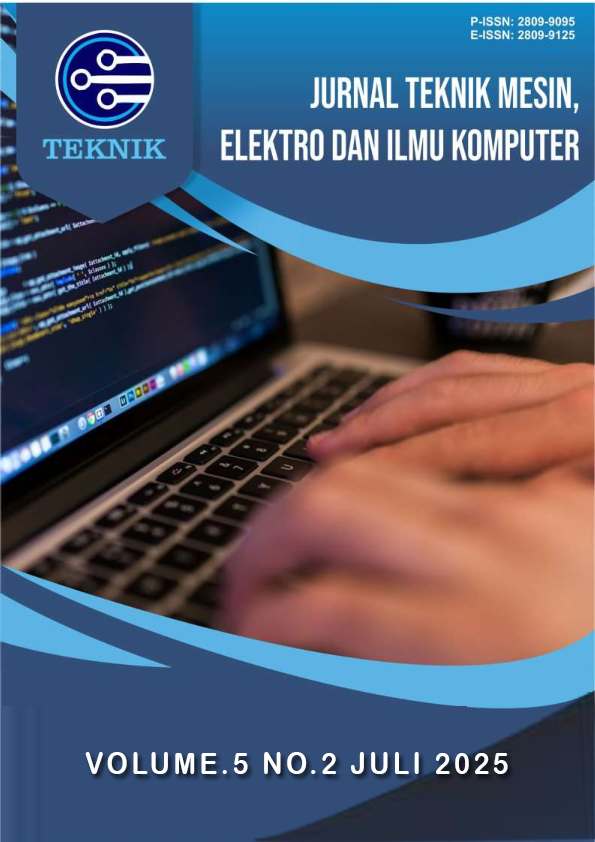Implementasi Geofencing pada Sistem Presensi Siswa dengan Verifikasi Lokasi Secara Real-Time: Studi Kasus SMK Islamic Center Baiturrahman
DOI:
https://doi.org/10.55606/teknik.v5i2.7131Keywords:
Student Attendance System , Geofencing, Parent IntegrationAbstract
Abstract. The progress of an educational institution is highly influenced by the quality of the systems it implements, one of which is the student attendance system. Currently, geofencing technology has become an innovative solution to enhance the accuracy and efficiency of attendance systems, especially with the integration of notifications to parents. However, SMK Islamic Center Baiturrahman Semarang still uses a conventional attendance system that has not yet adopted this technology. Therefore, this research aims to design and implement a Geofencing-based Student Attendance System integrated with parents to improve transparency and accuracy in student attendance. The research method used is Research and Development (R&D), which includes stages of needs analysis, system design, development, and product effectiveness testing. The results of this research are expected to provide an effective technological solution for SMK Islamic Center Baiturrahman Semarang in improving the quality of student attendance management and strengthening collaboration between the school and parents. With the implementation of this system, it is hoped that a more transparent, efficient, and technology-responsive educational environment can be created.
References
Aji Nugrahaning Widhi,. (2022). Pemanfaatan Framework Laravel untuk Pengembangan Sistem Informasi pada Toko Batik Ratho Ebu Berbasis Web. Melek IT: Information Technology Journal.
Ancok, D., & Bujang, D. (2020). Sistem Informasi Absensi Pegawai. Deepublish.
Brannon, C. (2022). Geofencing: Definition, types, and use cases. TechTarget.
Dhanalakshmi, R., & Prakash, M. P. (2020). Website Development and Its Importance in Today's Digital World. International Journal of Advanced Science and Technology.
Firestone, J. M. (2020). Knowledge management in organizations: A critical introduction. Routledge.
Gopalan, A., & Dhanalakshmi, D. (2021). An Enhanced Cloud Based Intelligent Tutoring System for E-Learning. International Journal of Interactive Multimedia and Artificial Intelligence.
Goyani, N. dan Trivedi, M. (2021). Performance Comparison of Server-Side Platforms: Node.js, Django and Ruby on Rails. International Journal of Recent Technology and Engineering.
Gupta, A., & Kumar, V. (2021). Geofencing: A comprehensive survey on concepts, technology and applications. Journal of Ambient Intelligence and Humanized Computing.
Hanna, D. P., & Schreiber, R. L. (2021). Systems Engineering: Principles and Practice (4th ed.). CRC Press.
Hossein Soltani, dkk. (2020). International Journal of Advanced Computer Science and Applications.
Jeonghoon Mo dan Junseok Lee. (2021). Geofencing Technologies: A Survey. Electronics.
Kalyani. (2020). International Journal of Engineering and Advanced Technology. Kusumo, H., Muthohir, M., & Rakasiwi, S. (2022, Maret 1). Implementasi RFID
Pada Sistem Absensi dan Penggajian Karyawan (Studi Kasus di PT. Kartika Utama Semarang).
Małgorzata Okręglicka, Agnieszka Szparaga, dan Monika Skorek-Osikowska. (2020). Research and Development (R&D) Method for the Creation of Innovative Solutions in the Field of Intellectual Property Management. Journal of Open Innovation: Technology, Market, and Complexity.
Mark L. Gillenson. (2020). Fundamentals of Database Management Systems. John Wiley & Sons, Inc.
Marlein, T., Sambono, J., & Ebenhaizer, J. (2021, Juni 1). PERANCANGAN SISTEM ABSENSI PINTAR MAHASISWA MENGGUNAKAN TEKNIK QR CODE DAN GEOLOCATION.
Munir, R. (2022). Pemrograman Aplikasi Mobile Android. Penerbit Andi. Munir, R., Saputra, A. H., & Febriani, R. (2021). Analisis Penggunaan Metode
Geofencing pada Aplikasi Perpustakaan Online. Jurnal Informatika: Jurnal Pengembangan IT.
Nazeer, I., & Awan, M. A. (2021). A Comprehensive Study on Mobile Application Integration. Wireless Personal Communications.
Ni’matul Ma’muriyah. (2021, Desember 2). Perancangan dan Pembuatan Sistem Absensi Portable Berbasis Fingerprint.
Noor, M., & Rahman, A. (2021). Sistem Informasi Absensi dan Penggajian. Penerbit Andi.
Nugroho, R. A. (2017). Pengantar Sistem Informasi. Penerbit Andi. Nurdiyanto, R., Hidayanto, A. N., dan Nurcahyo, W. (2021). Analisis Dan
Perancangan Sistem Basis Data Di Desa Gondosuli, Banyumas, Jawa Tengah. Jurnal Sistem Informasi Bisnis.
Permana, I. G. T., Rusdianto, D. S., & Fanani, L. (2019, September 9). Pengembangan Sistem Presensi berbasis Lokasi menggunakan Geofence W i F i dan REST API pada Fakultas Ilmu Komputer Universitas Brawijaya.
Prayudi, Y. (2018). Pengantar Sistem Informasi. Penerbit Prenada Media.
Purnama, dkk. (2021). Implementasi Sistem Informasi Akuntansi pada Koperasi Berbasis Web. Jurnal Ilmiah Teknologi dan Sistem Informasi.
Purqon, A. (2021). Rancang Bangun Sistem Informasi Penjualan dan Persediaan Barang pada PT Surya Sakti. Jurnal Ilmiah Teknologi dan Informatika.
Rad, R., & Etaati, L. (2020). Practical Business Intelligence. Packt Publishing. Rahmah, A. (2020). Pengembangan Aplikasi Mobile dengan Android Studio. Penerbit Informatika.
Raj, P. dan Mahajan, V. (2020). A Comparative Study of Popular Programming Languages for Machine Learning. International Journal of Computer Applications.
Rastogi, A. dan Tripathi, P. (2021). React Native Based Mobile App Development for Education Sector. International Journal of Emerging Trends in Engineering Research.
Saragih, H., & Rahardjo, B. (2020). Analisis Penggunaan Unified Modeling Language (UML) dalam Perancangan Sistem Informasi Akademik pada SMK XYZ. Jurnal Teknik Informatika dan Sistem Informasi.
Sikha Bagui dan Richard Earp. (2021). Database Design Using
Entity-Relationship Diagrams. Auerbach Publications. Suryani, S. (2021). Pengenalan Android dan Aplikasi Pengembangan. Deepublish.
Talbot, J. (2021). Information Quality. In the International Encyclopedia of Human Geography.
Wahyuni, S. (2022). Penerapan Algoritma Deep Learning Untuk Sistem Absensi Kehadiran Deteksi Wajah Di Pt Karya Komponen Presisi.
Downloads
Published
How to Cite
Issue
Section
License
Copyright (c) 2025 Jurnal Teknik Mesin, Elektro dan Ilmu Komputer

This work is licensed under a Creative Commons Attribution-ShareAlike 4.0 International License.









